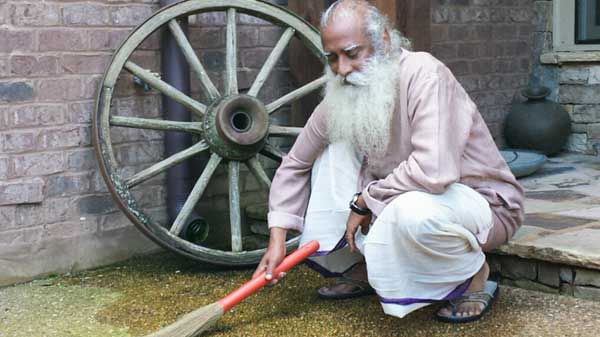Sadhguru on the Clean India Campaign on NDTV
Sadhguru was interviewed by NDTV’s Vikram Chandra on October 2, Gandhi Jayanthi, about peace, non-Violence and cleanliness. Part of the interview is covered in the video, and the rest is in the article below, from the Week magazine.

Ancient India had a tremendous sense of aesthetics and an equally astute sense of hygiene, which largely continues today but is now limited to personal hygiene alone. Unfortunately, the abject poverty that has spanned over the last ten generations, further complicated by the population pressure, has made our surroundings extremely unhygienic. Above all, most administrations heading the municipalities of towns and cities are not treating the issue of living in filth as seriously as they should. As a result, many parts of the nation, including urban centers which draw enormous international attention like Bangalore or ultimate sacred pilgrimage places like Kashi, have people wading through filth. Cleaning India is not a stupendous task if all Indians stand by it. It then becomes absolutely commendable and truly fantastic when this nation's Prime Minister takes up this issue hands-on by making it a national movement.
Subscribe
It has to be understood that to bring about a change in India, policy changes will not suffice. Only a people's movement that pulls at the heart strings will achieve the desired result through the beauty of transformation. While it is wonderful to see that the leadership at the highest level clearly understands this, it is distressing to see that those who are tagged as “opposition” seem to have misunderstood their role and have reduced themselves to opposing just about everything.
I heard that the Prime Minister's address of issues like cleanliness, women rights, child abuse and skilling the nation, have been labeled as “pedestrian issues.” 90% of this nation comprises of pedestrians. Only by addressing the so-called pedestrian issues will we be truly addressing those of the large mass of India. Even if everyone is not capable of physically cleaning their surroundings, everyone can get inspired enough to not be the cause of the filth around them. It is time for India to understand that it takes more than technology, industry and space capability to become a nation of worth in the eyes of other nations. We have to also present ourselves as a nation with a civic sense. It is an absolute necessity in order to create a great India. And it is not impossible. Over 30 years ago, along with a few organisations, I spearheaded a movement called “Clean India Campaign” in Karnataka and Andhra Pradesh. This was sustained for over four years by creating a strong sense of awareness, changing the fundamental way in which municipalities functioned. The results were impressive. In a handful of areas, this sustained for over 25 years.
One of the most painful experiences of travelling in this country is to see how places of great natural beauty, of national importance, of monumental grandeur, and spiritual significance, have been mercilessly inflicted with endless heaps of garbage. Our Jawans are selflessly fighting to guard our borders, our farmers are toiling away to feed this nation, our industrial workers are sweating it out to give us a foothold in the world. A simple way in which we can show our love for our country is by creating Clean India. The vital nature of this simple act specially needs to be grasped by all who are in positions of power and responsibility, big or small. This is not just the Prime Minister's movement. It is a crucial step for India to move ahead and truly prosper.

To be successful in this mission to clean India, one important step is to come up with simple ways of turning filth into wealth. The economic benefit of it will reinforce the laws that may have to be enacted for long term “Clean India.”
Bringing Mahatma into the picture is not only very touching, but a brilliant strategy.



